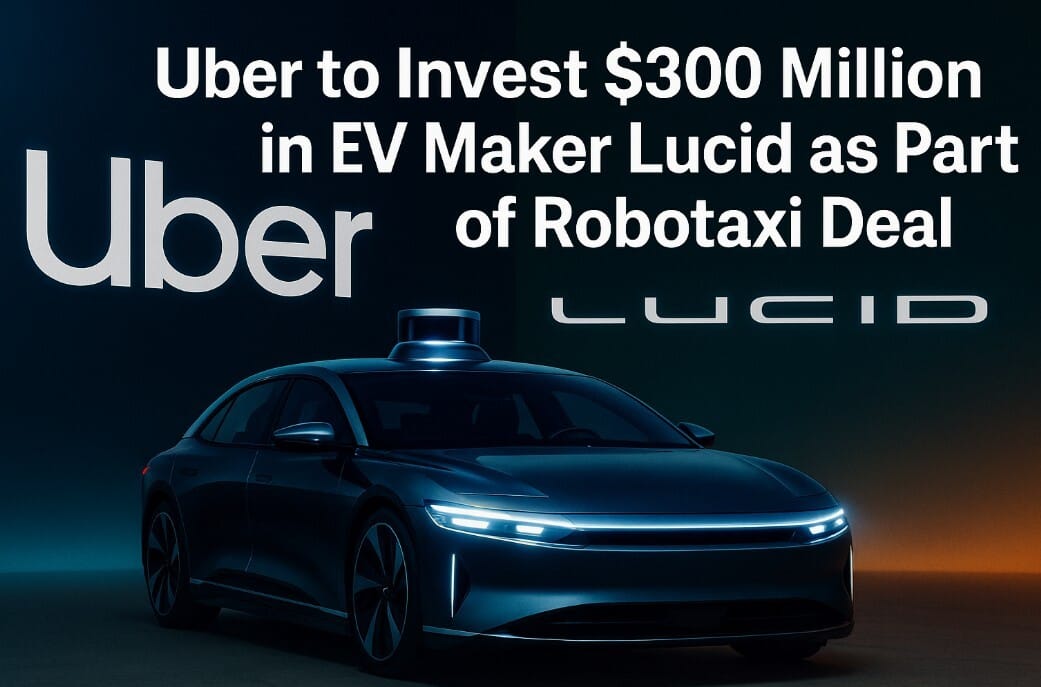- Live Life Grow Wealth
- Posts
- Uber to Invest $300 Million in EV Maker Lucid as Part of Robotaxi Deal
Uber to Invest $300 Million in EV Maker Lucid as Part of Robotaxi Deal

Today’s Headline
Uber to Invest $300 Million in EV Maker Lucid as Part of Robotaxi Deal
There are some headlines that make you stop and think. For me, this was one of them. When I read that Uber is investing $300 million into Lucid Motors, an electric vehicle (EV) manufacturer, I knew something big was brewing. This isn’t just a partnership. It’s a glimpse into the future of how we might travel.
Let’s break it down. Uber, the global ride-hailing giant, is teaming up with Lucid to build robotaxis—self-driving electric cars designed to shuttle people without human drivers. The $300 million investment is more than just money; it's a signal. Uber is doubling down on autonomous technology and green transportation. And Lucid? They're stepping beyond luxury EVs and into mass-market mobility.
“Want to Build a Brand That Attracts High-Value Clients & Investors? Read This.”
Marketing ideas for marketers who hate boring
The best marketing ideas come from marketers who live it.
That’s what this newsletter delivers.
The Marketing Millennials is a look inside what’s working right now for other marketers. No theory. No fluff. Just real insights and ideas you can actually use—from marketers who’ve been there, done that, and are sharing the playbook.
Every newsletter is written by Daniel Murray, a marketer obsessed with what goes into great marketing. Expect fresh takes, hot topics, and the kind of stuff you’ll want to steal for your next campaign.
Because marketing shouldn’t feel like guesswork. And you shouldn’t have to dig for the good stuff.
Why This Deal Matters
It Marks a Shift in Uber’s Strategy: Uber has long been experimenting with autonomous vehicles. Remember when they were testing self-driving cars in Arizona? That didn’t end well. But this time, they’re not doing it alone. By working with Lucid, which already has the tech chops and EV expertise, Uber is playing smarter.
It Validates Lucid as More Than a Tesla Rival: Up till now, most people knew Lucid for its high-end Air sedan, aimed at competing with Tesla's Model S. This deal positions Lucid as a partner in the next-gen transportation ecosystem. They’re not just building fast, sleek cars anymore. They’re helping shape how we move.
It Accelerates the Robotaxi Race: Everyone from Tesla to Google’s Waymo to General Motors' Cruise has been trying to crack the robotaxi code. Uber’s new partnership puts more pressure on those players. If successful, Uber could leapfrog back to the front of the race.
What's in It for Uber?
Uber sees robotaxis as a way to cut costs. Right now, drivers take home a huge chunk of the fare. If you remove the driver, profits go up. Plus, robotaxis can run almost 24/7. That means more rides, less downtime.
Also, EVs are cheaper to maintain than gas cars. So in the long run, Uber saves money on fuel and repairs.
But more importantly, it’s about staying relevant. Uber has faced heat from regulators, angry drivers, and competition from other apps. Going autonomous and electric may be the clean slate it needs.
What About Lucid?
For Lucid, this deal is a golden opportunity. Unlike Tesla, which has the scale and infrastructure to test robotaxis on its own, Lucid needed a partner with reach. Uber provides that.
Lucid will get its EVs into the hands of millions without needing to build showrooms or convince individual buyers. If the deal scales, Lucid gets recurring orders, steady revenue, and global exposure.
Plus, this partnership gives them valuable data. The more miles the Lucid robotaxis drive, the more information the company can use to improve its tech.
Will It Work?
Now, let’s be real. We’ve seen a lot of robotaxi hype before. Many companies have over-promised and under-delivered. Tesla’s Full Self Driving still isn’t fully self-driving. Cruise and Waymo are limited to small areas. So what makes this different?
It’s the timing. Tech has come a long way. So has AI. And cities are slowly warming up to the idea. Add in Uber’s global presence and Lucid’s engineering power, and this may be the combo that finally makes it happen.
Still, there are roadblocks:
Regulations are strict and vary from city to city.
Accidents involving self-driving cars have made people nervous.
And robotaxis need massive testing before full launch.
What It Means for the Market
This deal could trigger a domino effect. If Uber and Lucid pull this off, others will follow. We could see more tie-ups between ride-hailing apps and EV companies.
It also puts pressure on traditional carmakers. If robotaxis take off, fewer people will need to own cars. That could hurt car sales but boost usage of EVs.
And let’s not forget the investment angle. Lucid stock surged after the announcement. Uber’s move may signal a long-term strategy, which could excite investors looking for future growth stories.
How I’m Thinking About It
As someone who watches the EV and tech space closely, this deal checks a lot of boxes:
It’s bold
It’s forward-looking
It combines clean energy and automation
But I’m also cautious. We’ve seen big headlines before that didn’t live up to the hype. This time, I’m watching for action. When will the first Lucid robotaxi hit the road? Will regulators allow it? How will customers respond?
Final Takeaways
Here are 3 things to consider as a takeaway:
The Mobility Game is Changing: The future of transport may not involve owning a car. You might just open an app and ride a self-driving EV.
Think Long-Term: If you’re an investor, this could be the early days of a major transformation. Lucid and Uber may be onto something, but it won’t happen overnight.
Stay Informed: The next few years will bring big changes. Cities, companies, and consumers will all have to adapt. Keep an eye on who’s making smart moves today.
In the end, Uber’s $300 million bet on Lucid isn’t just a deal. It’s a vision. Whether it becomes reality is something we’ll all be watching closely.
Talk soon,
Your Friendly Finance Explorer
[Live Life Grow Wealth]
DISCLAIMER
I make no representations, warranties, or guarantees, whether expressed or implied, that the content provided is accurate, complete, or up-to-date. Past performance is not indicative nor a guarantee of future returns.
I am an individual content creator and not regulated or licensed by the Monetary Authority of Singapore (MAS) as I do not provide investment services.
All forms of investments carry risks, including the risk of losing your entire invested amount. Such activities may not be suitable for everyone. You are strongly encouraged to seek advice from a professional financial advisor if you have any doubts or concerns.

